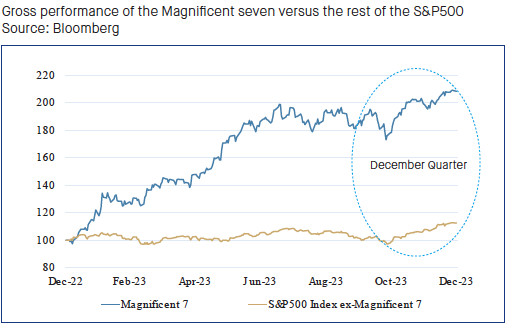The investment market in 2023 was strong – unlike the year prior – largely thanks to an impactful December quarter. It’s a great example of the need for patience and a reminder of the importance of a long-term view when investing.
The positive returns were driven by what we’re calling the “everything rally” – a perfect storm of equities rallying and debt securities (bonds) more than reversing the losses recorded in the previous quarter.
The rally began in November when inflation fell faster than expected and spurred hopes of central banks cutting interest rates in most major economies. This saw recession fears replaced with growing confidence that central banks will achieve their inflation targets without tipping economies into recession.
In December, that confidence was boosted by the US Federal Reserve changing its outlook to include three forecast interest rate cuts in 2024. This fanned investors’ expectations of deeper and faster cuts, which led to higher equity prices.
Equities responded strongly to the news
Equity markets finished the year on a high note, with global equities producing a quarterly gain of +5.4% in New Zealand dollar terms, driven largely by the US equity market finishing just shy of an all-time high. While the “Magnificent Seven” (Alphabet, Amazon, Apple, Meta, Microsoft, Nvidia and Tesla) produced most of the US equity market gains in 2023, the rally broadened to the rest of the market in the December quarter. You can see this when you look at the tech-dominated NASDAQ Index – up +14.3% and the broader S&P 500 Index’s gain of +11.2% – both in the December quarter.
Elsewhere, equity market returns were more modest at around +2 to +6% returns over the quarter. And closer to home, the Australian equity market produced a strong +8.9% gain in New Zealand dollars, while the New Zealand equity market was more subdued at +2.7%.
Debt securities join the rally.
Before the December quarter, it looked like 2023 would be another ho hum year for investors in New Zealand bonds. But the December quarter delivered strong returns.
Better New Zealand bond returns were attributed to growing optimism that inflation was cooling, and interest rates would soon be lowered. As a result, there was increased demand for bonds, which drove prices up and saw interest rates fall. As a result of the 5.0% quarterly gain, NZ bonds avoided a third straight year of losses, producing a +7.5% annual return.
This in many ways restored value in bonds that was challenged in 2022.
Looking forward in 2024
Globally, economic activity is likely to slow but we see recession being avoided in 2024. While key economic uncertainties remain, severe economic outcomes look less likely than in 2023. After a year to forget in 2022, last year was a lot better for New Zealand bond returns.
We expect New Zealand’s longer-term interest rates to decline, echoing our expectations of global rates. This increases the attractiveness of New Zealand bonds as falling interest rates increase their capital value. On balance, the evidence suggests relatively balanced risks around global equities, which supports a neutral exposure to this asset class.
Investment implications
The 11th-hour rally of the markets to the end of 2023 will have restored the faith of many investors in the markets. That said, for 2024 investors should continue with a disciplined approach to diversified asset allocation in quality assets to ensure they make the most out of having a balanced portfolio.
Note: This article was written on 15 Jan 2024.



